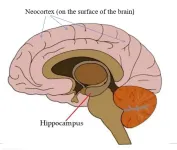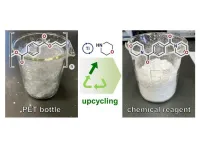Is this how antidepressants work, and why they take weeks to kick-in?
2023-10-09
(Press-News.org)
Type of work: peer-reviewed/randomised controlled trial/people
SSRI antidepressants normally take a few weeks before any showing mental health benefits, but how come it takes so long? Now a study from a group of clinicians and scientists provides the first human evidence that this is due to physical changes in the brain leading to greater brain plasticity developing over the first few weeks of SSRI intake. This may also begin to explain one of the mechanisms of how antidepressants work.
This work is presented at the ECNP conference in Barcelona on 9th October. This work is also due to be published (has been accepted) in a peer-reviewed journal.
Doctors have been puzzled as to why Selective Serotonin Reuptake Inhibitors (SSRIs) take time before having an effect. Researchers in Copenhagen, Innsbruck, and University of Cambridge have undertaken a randomised, double-blind placebo-controlled study in a group of healthy volunteers which shows a gradual difference in how many nerve cell connections (synapses) the brain cells have between those taking the antidepressants and a control group, depending on how long the treatment lasts.
17 volunteers were given a 20mg daily dose of the SSRI escitalopram, with 15 volunteers given a placebo. Between 3 and 5 weeks after starting the trial, their brains were scanned with a PET (Positron Emission Tomography) scanner, which showed the amount of synaptic vesicle glycoprotein 2A in the brain: this is an indicator of the presence of synapses, so the more of the protein is found in an area, the more synapses are present in that area (i.e., greater synaptic density). These scans showed significant between-group differences in how the synapse density evolved over time.
Researcher Professor Gitte Knudsen (of Copenhagen University Hospital) said:
“We found that with those taking the SSRI, over time there was a gradual increase in synapses in the neocortex and the hippocampus of the brain, compared to those taking placebo. We did not see any effect in those taking placebo.
The neocortex takes up around half of the brain’s volume; it is a complex brain structure that deals with higher functions, such as sensory perception, emotion, and cognition. The hippocampus, which is found deep in the brain, functions with memory and learning.
Professor Knudsen continued, “This points towards two main conclusions. Firstly, it indicates that SSRIs increase synaptic density in the brain areas critically involved in depression. This would go some way to indicating that the synaptic density in the brain may be involved in how these antidepressants function, which would give us a target for developing novel drugs against depression. The second point is that our data suggest that synapses build up over a period of weeks, which would explain why the effects of these drugs take time to kick-in.
Commenting, Professor David Nutt (Imperial College, London) said “The delay in therapeutic action of antidepressants has been a puzzle to psychiatrists ever since they were first discerned over 50 years ago. So these new data in humans that uses cutting edge brain imaging to demonstrate an increase in brain connections developing over the period that the depression lifts are very exciting. Also they provide more evidence enhancing serotonin function in the brain can have enduring health benefits”.
This is an independent comment, Professor Nutt was not involved in this work.
The conference abstract,” Escitalopram increases synaptic density in the human brain over weeks” (Johansen et al) can be seen at https://www.ecnp.eu/congress2023/ECNPcongress/programme/programme#!abstractdetails/0000552740
This work has also been accepted in a peer-reviewed journal. Unfortunately it is still in the final stages of the publication process, so we are not yet allowed to give publication details.
END
[Attachments] See images for this press release:

ELSE PRESS RELEASES FROM THIS DATE:
2023-10-09
Type of work: Peer-reviewed / experimental study / people
Up to a third of mothers don’t bond well with their babies after birth, causing intense emotional distress to both mother and baby1. Now researchers have found that they can train at-risk expectant mothers to recognise and regulate emotions better, potentially reducing their risk of postpartum depression.
Presenting the work at the ECNP Congress in Barcelona, researcher Dr Anne Bjertrup said:
People generally have an automatic tendency to see the positive or negative in any situation. In previous studies we saw that certain ...
2023-10-09
A loving bond between parents and their children early in life significantly increases the child’s tendency to be ‘prosocial’, and act with kindness and empathy towards others, research indicates.
The University of Cambridge study used data from more than 10,000 people born between 2000 and 2002 to understand the long-term interplay between our early relationships with our parents, prosociality and mental health. It is one of the first studies to look at how these characteristics interact over a long period spanning childhood and adolescence.
The researchers ...
2023-10-09
(Lugano, Monday, 9 October 2023) A major pan-European study has revealed that almost all patients affected by skin diseases face embarrassment, with the psychological burden compounding the physical impact of living with the disease.1,2
The Burden of Skin Disease in Europe, published today in the Journal of the European Academy of Dermatology and Venereology (JEADV), analysed 19,015 individuals with a range of skin diseases and revealed the huge psychological toll of living with a disease. The diseases examined included, amongst others, fungal skin infections, acne, atopic dermatitis (eczema), alopecia, psoriasis and sexually transmitted diseases (STDs).
With high levels of stigmatisation, ...
2023-10-08
Scientists using natural tracers off Queensland’s coast have discovered the source of previously unquantified nitrogen and phosphorous having a profound environmental impact on the Great Barrier Reef.
The findings, published today in Environmental Science and Technology, indicate current efforts to preserve and restore the health of the Reef may require a new perspective.
Southern Cross University’s Dr Douglas Tait leads the ground-breaking study, ‘Submarine groundwater discharge exceeds river inputs as a source of nutrients to the Great Barrier Reef’.
Submarine ...
2023-10-07
Tokyo, Japan – Researchers from Tokyo Metropolitan University have developed a new chemical process which upcycles polyesters, including PET in plastic bottles, to morpholine amide, a versatile and valuable building block for synthesizing a vast range of compounds. The reaction is high yield, waste-free, does not require harmful chemicals, and is easily scalable. The team successfully break the often costly closed-loop recycling loop of plastic waste, allowing upcycling to more valuable products.
Recycling plays an indispensable part of our fight against plastic waste. But at what ...
2023-10-07
Under overcast skies that stood no chance of clouding the celebratory tone of the day, hundreds of faculty, staff, students, alumni, neighbors, and academic leaders gathered today on the Medford/Somerville campus to witness the inauguration of Sunil Kumar as the 14th president of Tufts University. He succeeds Anthony P. Monaco, who served as president for 12 years.
Delegates from more than 85 academic institutions and learned societies around the world attended Kumar’s inauguration ceremony on the residential quad. The ceremony ...
2023-10-07
Type of work: peer-reviewed/experimental study/people
The first study to compare effects of antidepressants with running exercises for anxiety, depression and overall health shows that they have about the same benefits for mental health – but a 16-week course of running over the same period scores higher in terms of physical health improvement, whereas antidepressants lead to a slightly worse physical condition, as has been suggested by previous studies. However, the drop-out rate was much higher in the group which initially ...
2023-10-07
Not peer-reviewed/experimental study/people
Researchers have announced preliminary results of using wearable technology to measure electrical impulses in the skin and other physiological biomarkers which might be associated with mood changes in bipolar disorder. The work is at an early stage, but they hope that they will be able to build on these patterns to detect mood swings in bipolar disorder sufferers, so helping in diagnosis and potentially offering more rapid and personalized treatments.
Bipolar disorder (formerly called manic-depressive illness or manic depression) is a mental illness that causes swings in a ...
2023-10-07
The SUSTAIN Wellbeing COMPASS Coordinating Center of the University of Houston Graduate College of Social Work has made a lasting impact in the fight against the HIV epidemic in the Southern U.S. over the past five years, particularly for Black and Latinx-led organizations. The SUSTAIN Center is one of four across the South funded by the Gilead COMPASS Initiative®, an unprecedented 10-year, more than $100 million effort to address the Southern HIV epidemic by collaborating with local community organizations and stakeholders to use evidence-based solutions to meet the needs of people living with and impacted by HIV/AIDS.
Led ...
2023-10-07
Long before another school year started for K-12 students across Texas, a Texas A&M University-led team has been hard at work behind the scenes to position high school students throughout the Lone Star state for future college writing success.
Leading the college-readiness charge is Dr. Terri Pantuso, an instructional associate professor in the Department of English and associate dean for assessment and curricular matters in the College of Arts and Sciences, who recently received a $1.2 million service contract from the Texas Higher Education Coordinating Board (THECB) aimed at better ...
LAST 30 PRESS RELEASES:
[Press-News.org] Is this how antidepressants work, and why they take weeks to kick-in?






